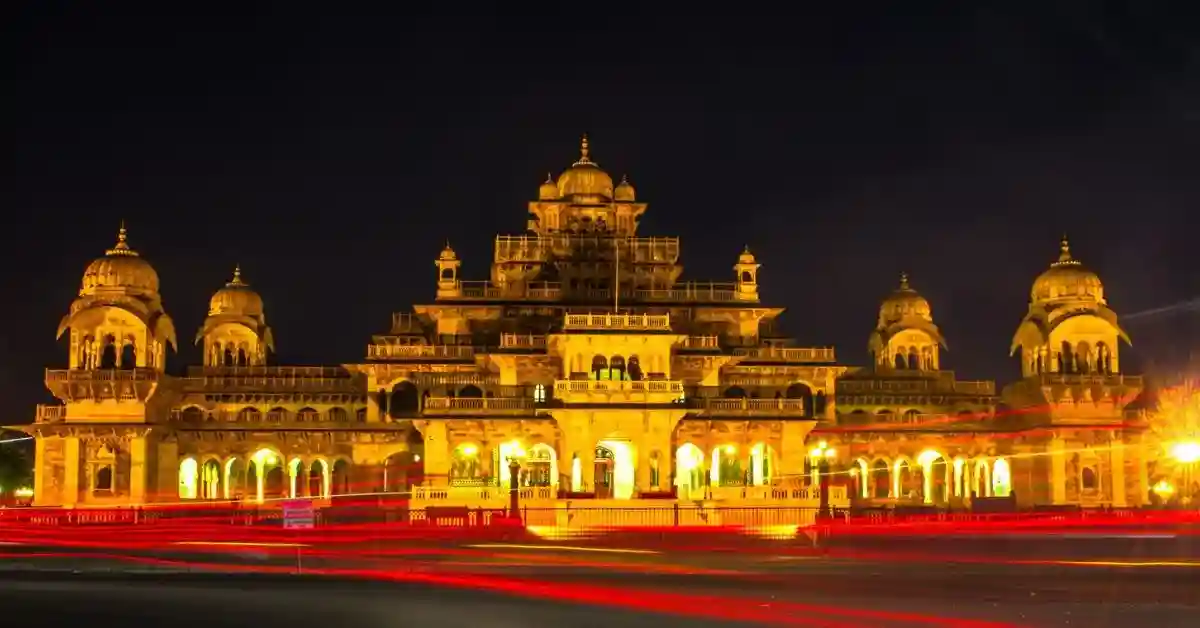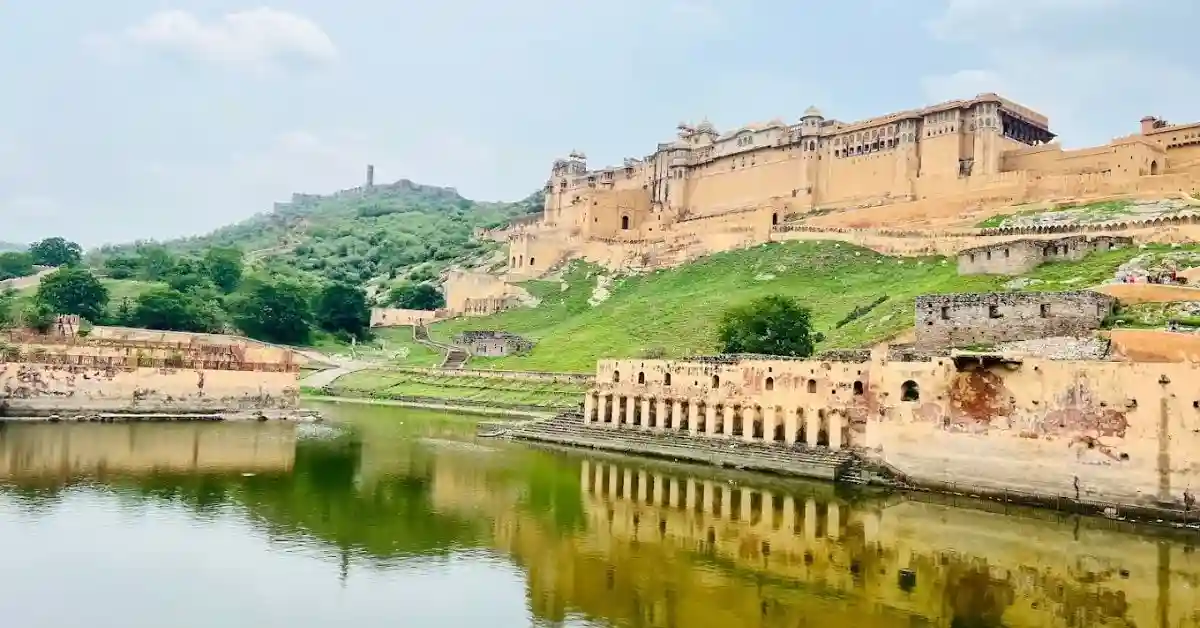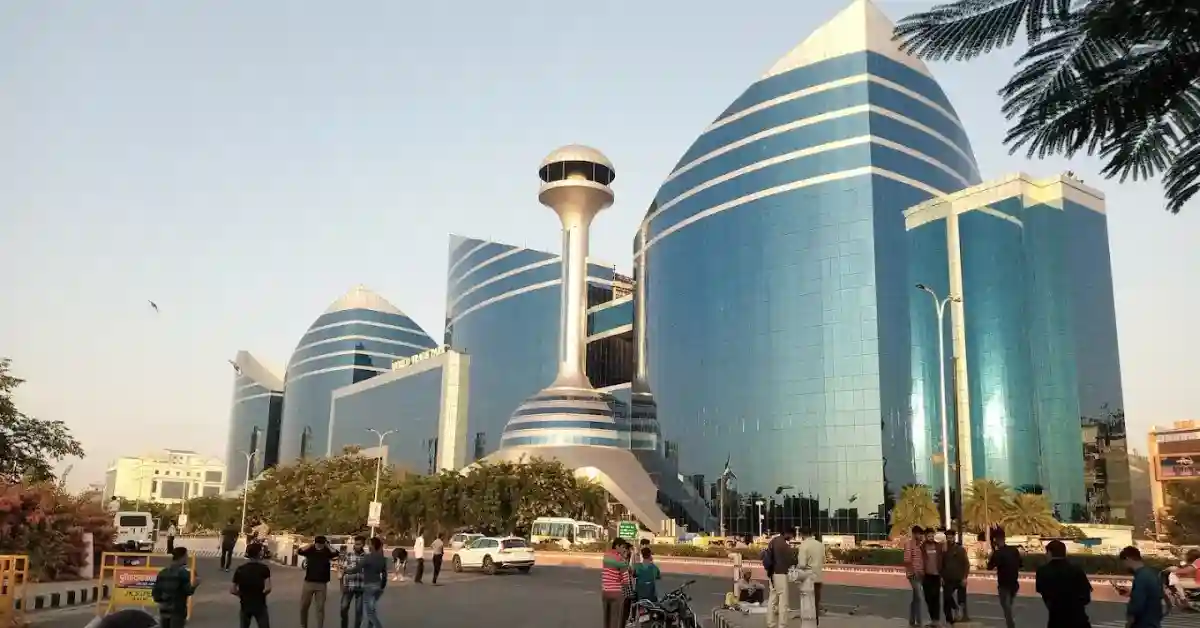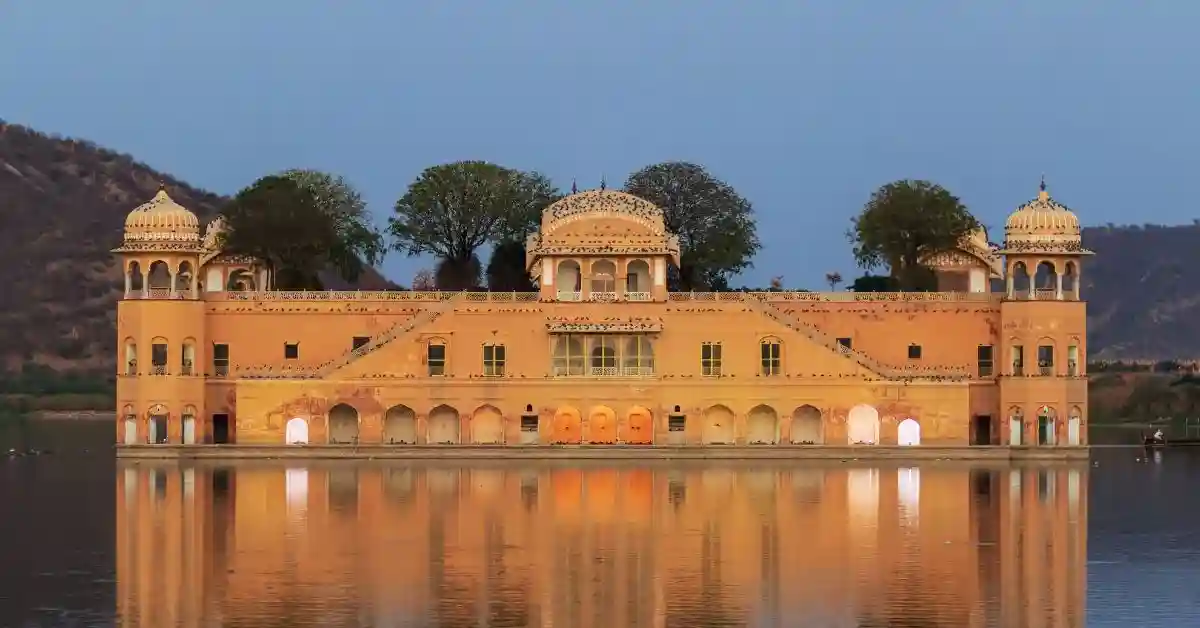About Albert Hall Museum Jaipur
Albert Hall Museum, also known as Government Central Museum is situated in the Ram Niwas Garden in Jaipur. It is the oldest monument in Rajasthan, designed by Sir Samuel Swinton Jacob. Originally, the museum was intended to be a concert hall, and later opened as a museum for the public in 1887. The museum got its name because of its resemblance with the Victoria and Albert Museum of London.
Albert Hall Museum has a diverse and extensive collection of artefacts brought from different parts of the world. The museum showcases a vast range of exhibits including rare manuscripts, sculptures, miniature paintings, arms and armour, textiles, ancient coins, carpets, pottery and decorative arts with its 16 Galleries. The corridor of the museum is decorated with murals that reflect various civilisations.
One of the museum’s attractions is the Egyptian mummy, a fascinating attraction which captivates visitors. The central hall of the museum has a large metal statue of King Edward VII on horseback. The museum gets illuminated with beautiful yellow lights at night which adds to its overall charm. You can enjoy relaxing in its well maintained garden or capturing a beautiful picture with the museum in the background.
The Albert Hall Museum is a testament to the rich history and cultural heritage of Rajasthan and is a must-visit destination for history enthusiasts, art lovers and anyone seeking to delve into the past.
History Of Albert Hall Museum Jaipur
The Albert Hall was constructed during the visit of the Prince of Wales, Albert Edward to Jaipur in 1876. Initially, the royals and governments had no purpose for the building and it was used as a town hall till 1980.
In 1980, Maharaja Sawai Madho Singh II suggested utilising the building to display the craftsmanship of local artisans. On this suggestion, a small museum was opened in 1881 within the building until the construction of Albert Hall Museum was completed in 1887. The museum was designed by Sir Samuel Swinton Jacob in assistance of Mir Tujumool Hoosain.
Initially, the museum used to display the personal collection of the Maharaja of Jaipur, Sawai Ram Singh II. Over the years, the museum expanded its collection and today it has a variety of artefacts including sculptures, paintings, arms and armour, textiles and musical instruments.
The Museum played a crucial role during the Independence movement by serving as the venue for many public meetings and rallies. The museum was also used as a temporary jail by Britishers to hold freedom fighters. The museum was handed over to the Department of Archaeology and Museums of Rajasthan in 1960. Since then, the museum has undergone numerous renovations and restoration efforts to preserve its grandeur and historical importance.
Architecture Of Albert Hall Museum Jaipur
The Albert Hall Museum showcases a captivating blend of Indo-Saracenic and Neo-Gothic styles. The architectural plan of the museum was conceived by Samuel Swinton Jacob with Mir Tujumool Hoosain. The structure of the museum was designed by Grand Victoria and Albert Museum of London.
The exterior of the museum’s building has a combination of Indian, Mughal and European architectural elements. The domes and arches of the building are the elements of Mughal architecture with red sandstone and white marble which are common in Rajasthani architecture.
The museum’s interior is very impressive and has a grand staircase, marble pillars and large galleries. The galleries of the museum have intricate ceilings which are adorned with murals and paintings. The central hall of the museum has a metallic statue of King Edward VII on horseback. The corridors of the museum are decorated with beautiful murals showing diverse civilizations.
The museum’s central dome is 28 metres high and made of Italian marble. The dome has eight marble pillars and has paintings which show scenes from Indian mythology. The unique architecture of the museum is a testament to the rich heritage and cultural legacy of Rajasthan.
Famous Exhibits At Albert Hall Museum Jaipur
The museum has 16 art galleries featuring antiques and heritage artefacts which have either been gifted or belong to the royal family of Jaipur. Here are the famous exhibits of Albert Hall Museum Jaipur:
- The Egyptian Mummy: The Egyptian mummy is the most popular exhibit enclosed in a glass case. It is around 4,000 years old and was gifted by the Egyptian Government to the museum in the 20th century. It attracts thousands of visitors annually to take a glimpse of what a mummy looks like.
- Pottery: This section of the museum has glazed pottery from Delhi, Singh and Multan region along with unglazed pottery from Bikaner and Hyderabad as well as the famous blue pottery of Jaipur.
- Sculptures: This section of the museum has a big collection of statues. There are blackstone sculptures of Yakshi from the 4th century. and the sculptures of Hindu gods and goddesses. The collection includes statues with different styles, periods and origins. These sculpures are crafted from materials like clay, metal, silver, brass, copper, bronze and marble showcasing intricate designs.
- Textile/Garment Gallery: This section of the museum shows the beautiful garments worn by the royal. They have used a variety of Kotadorai, Bandish work, lace work, Sanganeri print, Gota work and other ancient styles of embroidery.
- Carpet Gallery: This section of the museum has a stunning collection of Kaleen (carpets) from ancient times. The museum also has a rare “Persian Garden Carpet” which was purchased at the time of Mirza Raja Jai Singh I in 1632 AD. This section of the museum is dedicated to carpets from different times and styles. There are different types of carpet like for praying, or with Mughal designs, and one with circular design. There is also some carpet with floral designs and ancient doormats.
- Coin Gallery: This is the most interesting section of the museum which has on display the coins used by Mughals and Britishers. There are punched mark coins, which is said to be the earliest coins used in history. There are Mughal coins which belong to the reigns of Jehangir, Akbar, ShahJahan & Aurangzeb. This gallery shows us the evolution of the coin.
- Clay Art Gallery: This section of the museum has beautiful clay models from the 19th century showing yogic postures, sociological themes, craft-making, etc.
- Jewellery Gallery: This section of the museum has ornaments worn by peasants in the 19th century which are made of silver and brass. You can see various items such as anklets, rings, hair pins, bracelets and necklaces. The gallery also has expensive antiques such as golden waist belts, ear studs, earrings, rings, foot ornaments, etc.
- Metal Art Gallery: This gallery has a collection of metal items from the 19th century such as bowls, statues and plates adorned with Zodiac signs. It also has shields which depict the scene of the famous battles like Mahabharata and Ramayana. The figurines of the collections are made from various metals such as bronze, zinc and brass.
- Arms and Armour: This section of the museum has weapons and armours used by Rajputs, Mughals, Turkish and Hyderabadis. The gallery has swords, warrior helmets, tiger knives, spears, arrows and bows, etc.
- Ivory Gallery: This section of the museum has artwork crafted from elephant tusks (Ivory). It features ivory statues, mirrors, medicine boxes and various other items.
- Musical Instruments: This section of the museum has a variety of musical instruments such as the Sarangi, Sitar, Dhap, Pungi, Ravan Hatha, Sehnai, etc.
- Miniature Paintings: This section of the museum has a vast collection of miniature paintings from the Rajputs and Mughals traditions depicting the scenes from Indian Mythology, hunting scenes and portraits of royalty.
- International Art: This section of the museum has Japanese dolls from the 19th century, ancient Pharaonic artefacts from 1st century BC, Brass Buddha of Nepal, etc.
- Woodwork and Furniture: This section of the museum has detailed woodwork from Jaipur and Kashmir including ancient pieces like drummers, almirahs, boar boxes, figurines, etc.
- Tribal Artefacts: This section of the museum shows the tribal community of Rajasthan with items like masks, pottery and textiles which are unique to these commodities.
Albert Hall Museum Jaipur Tickets Price/Entry Fees
The General Tickets price of Albert Hall Museum of Jaipur is Rs 40 per person for Indians, Rs 20 per person for Indians Students (Valid ID), Rs 300 per person for Foreign tourists & Rs 150 for Foreign students.
| Category | General Tickets |
|---|---|
| Indians | Rs 40 per person |
| Indians Students (Valid ID) | Rs 20 per person |
| Foreign Tourists | Rs 300 per person |
| Foreign students | Rs 150 per person |
Jaipur Composite Ticket Price
The Jaipur Composite ticket price is Rs 422 for Indian Tourist & Rs 112 for Indian Students. The Jaipur Composite ticket price for Foreign Tourist is Rs 1102 & for Foreign student is Rs 352. It is valid for monuments like Amber Palace, Nahargarh Fort, Hawa Mahal, Albert Hall Museum, Jantar Mantar, Sisodiya Garden, Vidyadhar Garden and Isarlat Sargasuli. The composite ticket of Jaipur is valid for two days from the date of its issue.
| Category | Tickets Price |
|---|---|
| Indian Tourist | Rs 422 |
| Indian Student | Rs 112 |
| Foreign Tourist | Rs 1102 |
| Foreign Student | Rs 352 |
The museum also offers an audio guide. For foreign visitors, it is Rs 171 and for Indian visitors, it is Rs 114.
Albert Hall Museum Jaipur Online Ticket Booking
The ticket of Albert Hall Museum of Jaipur can only be booked offline.
Albert Hall Museum Jaipur Timings
The timings for Albert Hall Museum Jaipur is from 9 AM to 5 PM for day visits & 7 PM to 10 PM for Night Visit. Albert Hall Museum is open all 7 days of the week.
Best Time To Visit Albert Hall Museum Jaipur
The best time to visit Albert Hall Museum of Jaipur is during evening hours as the lights illuminate the building’s intricate architecture. It may take around 1-2 hours to visit the Albert Hall Museum.
Albert Hall Museum Jaipur Photos/Images
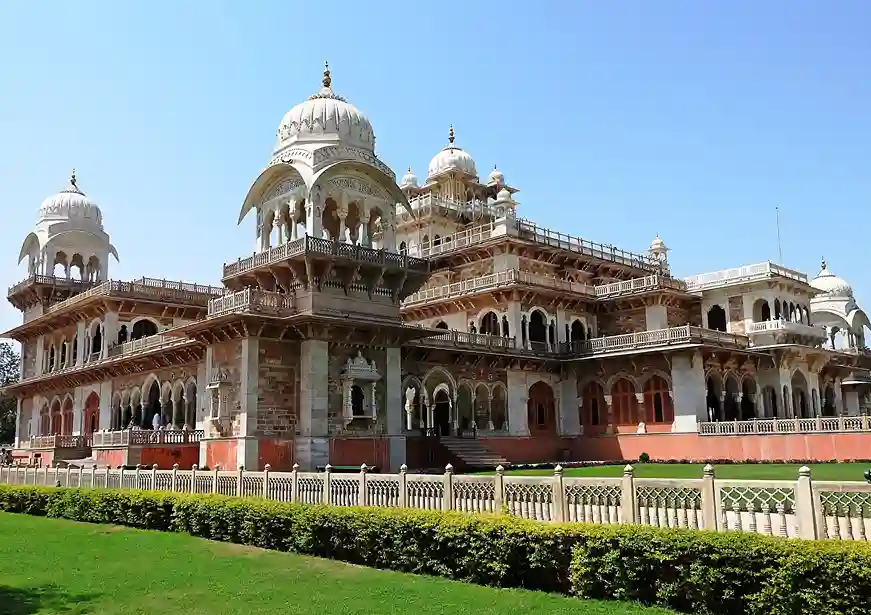
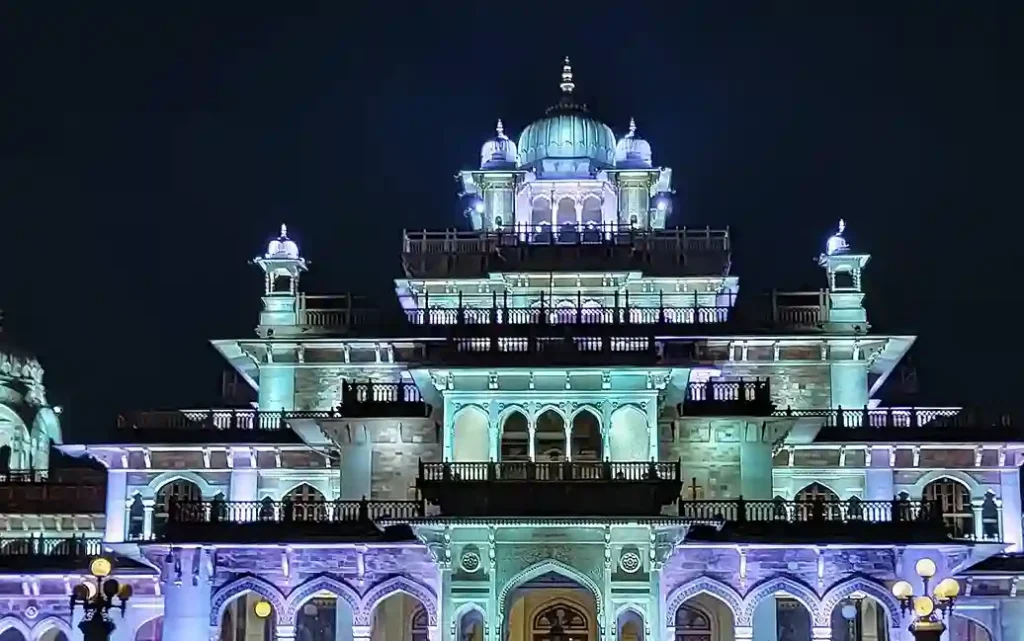
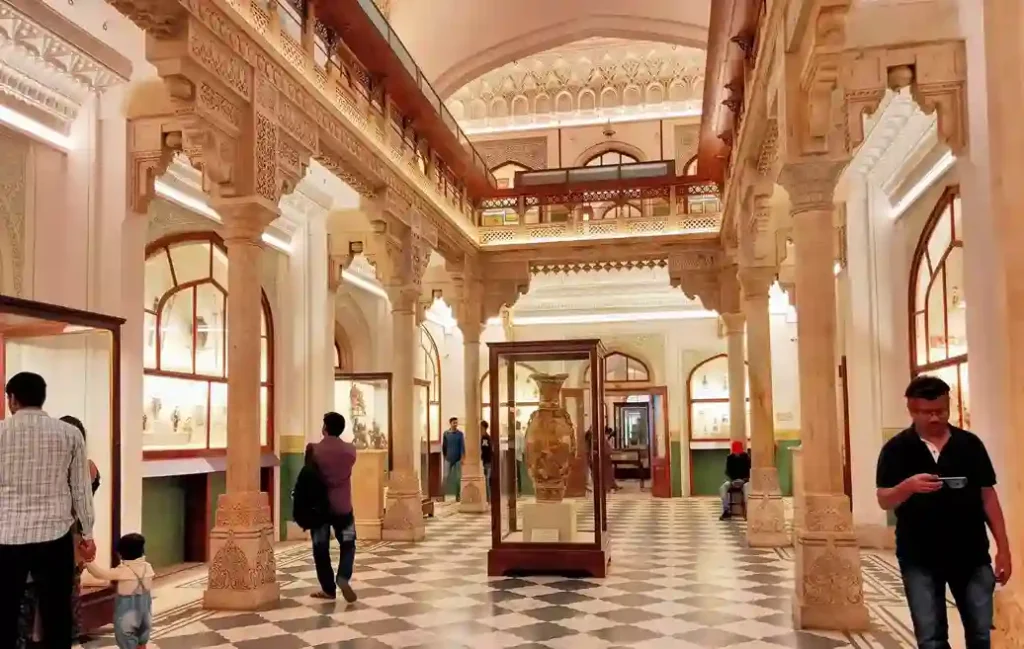
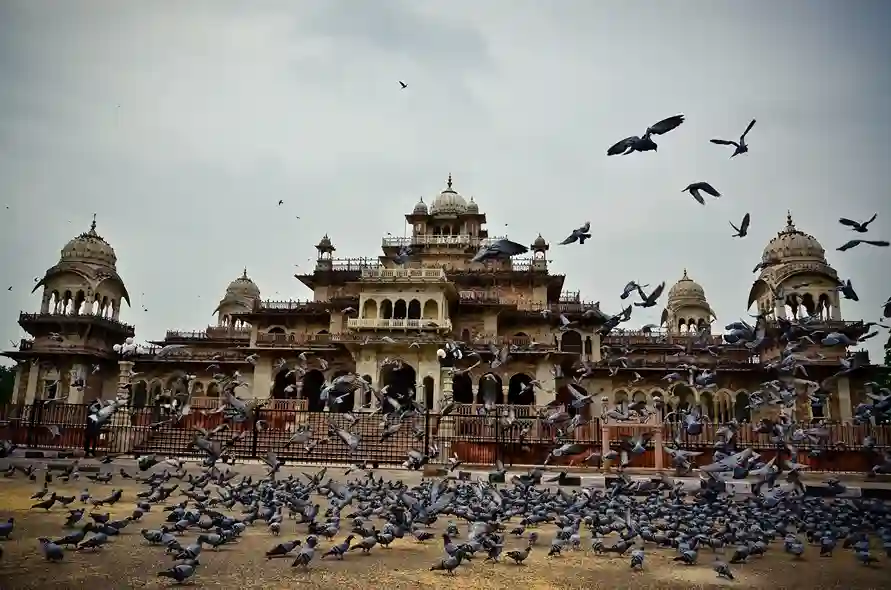
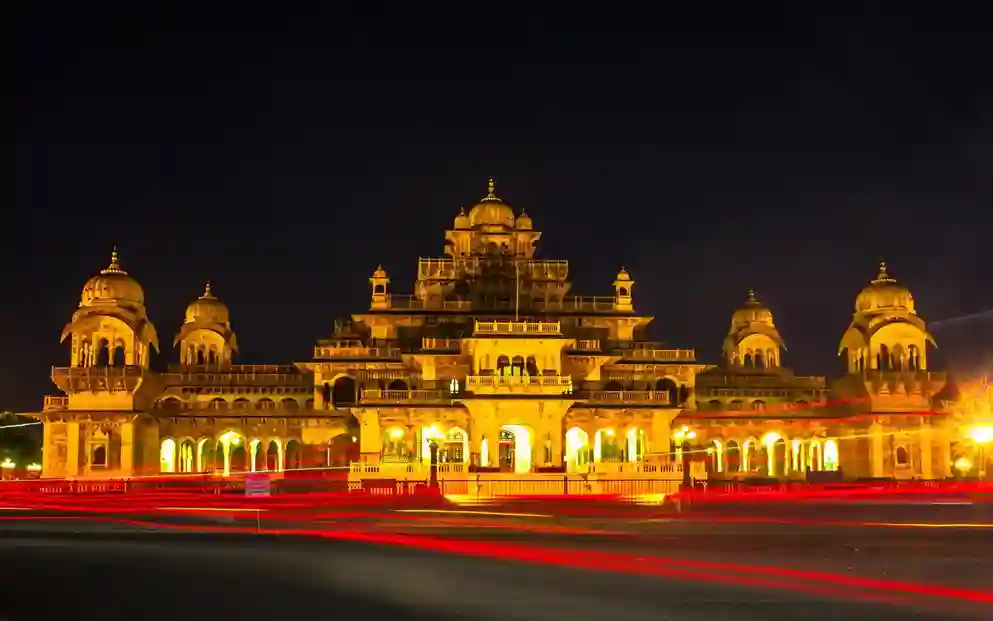
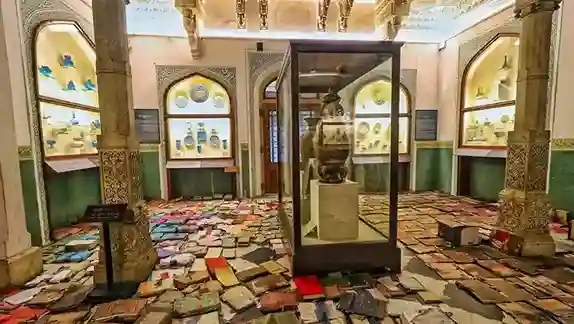
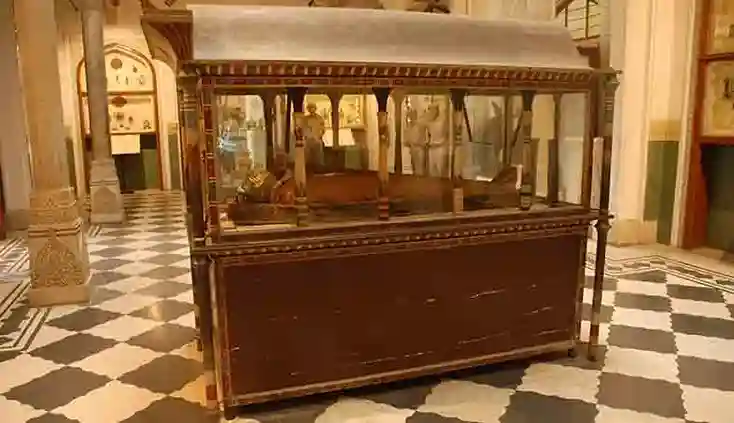
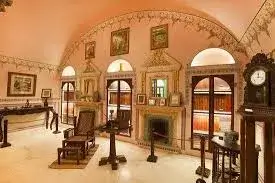
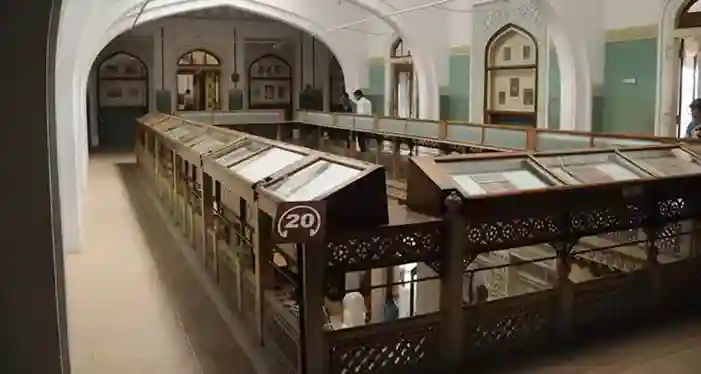
Things To Know Before Visiting Albert Hall Museum Jaipur
- Food and drinks are not allowed inside the museum.
- Photography is allowed inside the museum.
- Albert Hall Museum is usually open from 9 AM to 5 PM & 7 PM to 10 PM.
- Consider using public transport as parking here can sometimes be challenging.
Address Of Albert Hall Museum Jaipur
The Albert Hall Museum is located at Ram Niwas Garden, Ashok Nagar, Jaipur, Rajasthan.
How To Reach Albert Hall Museum Jaipur
Albert Hall Museum is located in the heart of Jaipur. It is easily accessible from all parts of the city. You can reach the Albert Hall Museum of Jaipur by the following modes of transport:
By Metro: The nearest Metro station to Albert Hall Museum Jaipur is Badi Chaupar Metro Station which is 1.8 Km away from the Museum. From there, you can take a rickshaw or book a cab to the museum.
By Bus: The Nearest Bus Stop to Albert Hall Museum of Jaipur is Ram Niwas Garden Bus Stop. You can reach the Bus stop by bus no. 3, 3A, 6A, 9A, AC 2 & AC 7.
By Cab/Rickshaw: You can easily book a cab or take a rickshaw to the Albert Hall Museum.
By Personal Vehicle: You can easily come with your personal vehicle.
Parking Facility At Albert Hall Museum Jaipur
Paid parking facility is available at the Albert Hall Museum in Jaipur.
Places To Visit Near Albert Hall Museum Jaipur
Top attractions to visit near Albert Hall Museum of Jaipur:
- Jaipur Zoo (100 m)
- Dolls Museum (1.4 Km)
- Isarlat Sargasooli (1.7 Km)
- Jantar Mantar (1.8 Km)
- Hawa Mahal (1.9 Km)
- The City Palace (1.9 Km)
- Central Park (2 Km)
- Birla Planetarium (2.1 Km)
- Birla Mandir (2.4 Km)
- Gaitor Ki Chhatriyan (4.1 Km)
- Nahargarh Fort (4.4 Km)
- Regional Science Centre And Science Park (5 Km)
People Also Read
Location Map For Albert Hall Museum Jaipur
FAQs
Is Albert Hall Museum Jaipur worth a visit?
Absolutely, Albert Hall Museum is a must-visit. Its captivating architecture and diverse collection of artefacts offers a rich cultural experience that’s worth exploring.
What is the timings of Light show of Albert Hall Museum Jaipur?
The timings of Light show of Albert Hall Museum Jaipur is From 7 PM to 10 PM.
What is the opening time of Albert Hall Museum Jaipur?
The opening time of Albert Hall Museum is 9 AM in the morning & 7 PM in the evening.
How much time do you need to visit Albert Hall Museum Jaipur?
You may required 1-2 hours to visit Albert Hall Museum of Jaipur.
What is the ticket price of Albert Hall Museum in Jaipur for students?
The ticket prices of Albert Hall Museum Jaipur for Students is Rs 20 per students with valid student ID.

